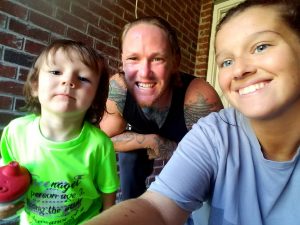‘I’ve Lived Through Death’ with SMA and ‘Through Life’ with Spinraza, Mom Says in Interview
Written by |

Chance McCalvin, who was born with SMA, has been on Spinraza since he was 8 days old. (Photo courtesy of Destiny McCalvin)
Destiny McCalvin gave birth to her second child, a girl she named Kenzlee, after what she and her doctors took to be an uneventful pregnancy in 2011.
“She seemed like a normal baby; she weighed 7 pounds 7 ounces, no issues,” her mother said.
But “issues” soon became clear: “It was about a month or two in when I started noticing … that’s the time when children usually have some type of neck control where she had none. Her head would just lean on her shoulders, and then she would always clench her little hands together … I didn’t know why she was doing that,” McCalvin said in a phone interview with SMA News Today.
Physicians kept telling her to be patient, to wait until Kenzlee was older before counting motor milestones. But evident problems persisted, and Destiny — now with pressure from her husband, Justin — was finally able to get the baby referred to UF Health Shands Hospital, a neurology clinic a few hours away from their Florida home.
Kenzlee was admitted after an examination, and her parents taken into a private room where a neurologist told them that Kenzlee had “every sign for spinal muscular atrophy.”
No treatments were available; in 2012, SMA was for babies like Kenzlee a death sentence.
Are you on Spinraza? Join our forums and share your experience with other patients and caregivers.
“We just broke down,” McCalvin said. “There’s no cure, no treatment, there’s nothing … They gave her two weeks. She actually lived two months past that doctor visit.” She was 7 months old.
Destiny McCalvin is telling her story because a third child, Chance, was also diagnosed — before his birth in 2015 — but began treatment at 8 days old in a trial sponsored by Biogen of what would become Spinraza (nusinersen), to date the only approved disease-modifying treatment for all SMA types.
Now age 3, Chance is walking and talking like any toddler.
“All in all, it made me who I am,” McCalvin said of her daughter’s death, and her reason for being an advocate of SMA treatment and newborn testing. “I wanted it to make me a stronger person, and that’s kind of where I’ve put myself now. That’s why I’m doing what I’m doing now…. I want to do something about it.”
Her journey with Chance began with a support group she found on Facebook, that offered comments on “study trials from gene therapy to treatment — all kinds of stuff.” One stood out because of its relative closeness to her home.
“I reached out to that physician … I was just like, ‘Here’s our story. There it is, and I really need your help,'” she said. The doctor worked with his institute to get approval for the baby, once born, to enroll in the NURTURE Phase 2 clinical trial (NCT02386553), an open-label and long-term study of Spinraza in “genetically diagnosed and presymptomatic” infants with SMA.
“We got a call about two weeks before Chance was born saying that he was approved and we’ll be seeing him [that doctor] right after Chance is born.”
Chance was born with jaundice, and his medical team put a priority on treating that condition first, not really understanding “the whole SMA thing because it’s very rare,” McCalvin said.
“The day they released him for the jaundice, I went straight home and I packed my bags and … went straight to Orlando with him — me and my husband — we didn’t even care about being home. We were just like, ‘We gotta get this treatment.’ So we drove straight down to [Nemours Children’s Clinic] and he got it [Spinraza] the next day.
“And he’s been getting it every four months since.”
Now, Chance is walking, talking, and eating normally. “I named him Chance because I wanted to give him a chance and look at him,” said Destiny. “It is insane how much this drug has made him normal. … That drug is a miracle.”
Her son has not had any treatment-related side effects or medical problems — at least, nothing that wouldn’t be expected for a 3-year-old. “If he gets a common cold, I deal with it like a normal kid has a common cold. You get cough medicine. That’s it. … He’s never had anything out of the ordinary.”
Even the considerable drive every four months to Orlando for treatment, or at other times for evaluations required to continue in NURTURE, isn’t a major inconvenience in Destiny’s eyes. For Chance, the worst part is not eating for 12 hours prior to his treatment, so the McCalvins fast together as a family.
Then, “as soon as he wakes up … we have just like a little pizza party.”
Because Chance is enrolled in a clinical trial, his costs — including both medical and others, like transportation — are covered by Biogen. “Biogen has gone out of their way to do everything,” McCalvin said. “It’s my child’s life so I couldn’t be more grateful about it.”
She wants to share her story so more people might understand SMA. “Nobody really knows about it until it affects you. And the craziest thing for me is that it’s the No. 1 genetic killer … in infants under 2.”
“I might not be the best person with the best words,” she added, “but I’ve been through the experience of it and nothing
speaks louder than that.”
McCalvin’s also a strong advocate of newborn screening for SMA’s disease-causing mutation, which is now routinely done in five U.S. states and on the way to possibly being implemented in 13 more.
“I’m just really trying to help get awareness out so once this screening does happen, people know, ‘Hey, this is definitely something you should be aware of.'”
How does Chance feel about being a poster child of sorts? Time will tell, but for now, he has bigger things to worry about — like playing on a jungle gym.
“I don’t think he knows how inspirational he is to people,” his mother said. “But I think he’s going to start warming up to that because that’s going to be his life. It’s gonna be a big thing for a while.”
McCalvin has opened a Facebook page for her son — Cure Chance — and said message people leave there “are supportive and positive.” Everyone, she added, is “more than welcome to watch and see what goes on in Chance’s life.”
She “definitely encourages” any parent told their child has SMA “to get Spinraza treatment immediately, as soon as possible in whatever way you can … I’m telling you now, it works and it’s worth it.
“I’ve lived through the death” of having a child with SMA, McCalvin said, and “I’ve lived through life through Spinraza.”





